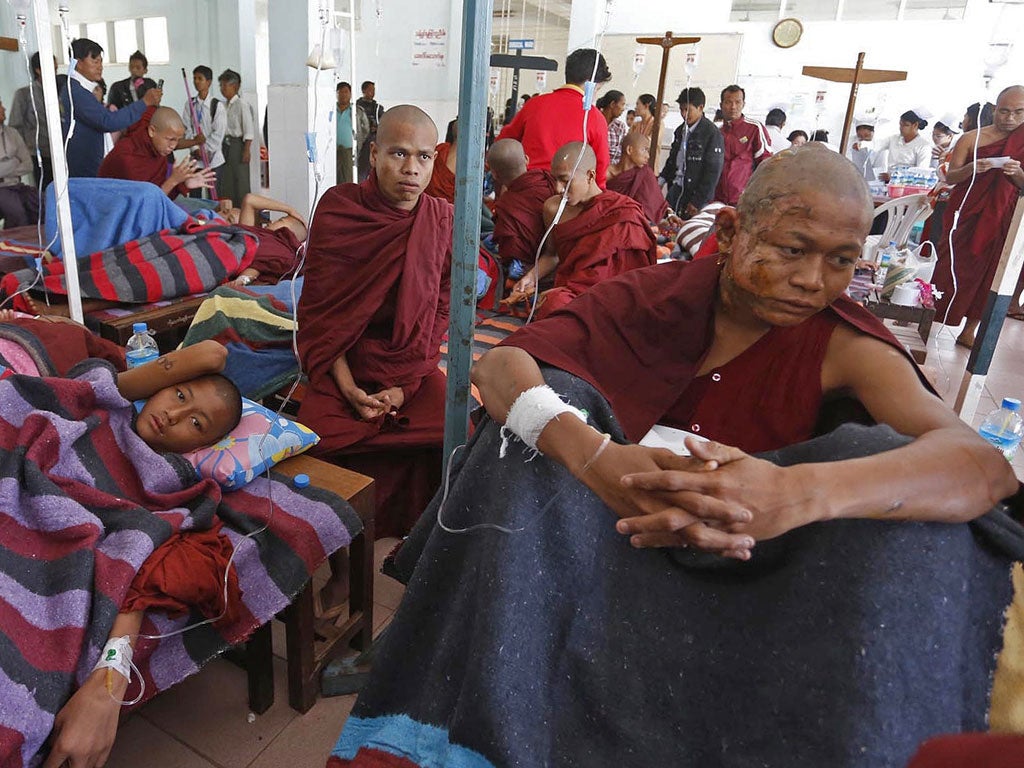Limits of 'new' Burma tested after protest ends in violence
Villagers and monks injured after police break up demonstration at mine using smoke bombs

Your support helps us to tell the story
From reproductive rights to climate change to Big Tech, The Independent is on the ground when the story is developing. Whether it's investigating the financials of Elon Musk's pro-Trump PAC or producing our latest documentary, 'The A Word', which shines a light on the American women fighting for reproductive rights, we know how important it is to parse out the facts from the messaging.
At such a critical moment in US history, we need reporters on the ground. Your donation allows us to keep sending journalists to speak to both sides of the story.
The Independent is trusted by Americans across the entire political spectrum. And unlike many other quality news outlets, we choose not to lock Americans out of our reporting and analysis with paywalls. We believe quality journalism should be available to everyone, paid for by those who can afford it.
Your support makes all the difference.Dozens of monks and villagers suffered burns and other injuries after Burmese police used water cannons and smoke bombs to break up a protest at the site of a huge copper mine partly owned by the military.
In scenes that activists say highlight how democratic reforms in Burma have only gone so far, police moved in early yesterday morning to force out the demonstrators and end the three-month long protest.
Reports said truckloads of police arrived at six protest camps that had been established at the Letpadaung mine near in the north-west of the country. They then used water cannons and smoke bombs to disperse the protesters, a number of whom suffered bad burns from what the local media described as “phosphorous bombs”, though the government denied that such munitions were used.
“I didn’t expect to be treated like this, as we were peacefully protesting,” Aung Myint Htway, a peanut farmer whose face and body were covered with black patches of burned skin, told the Associated Press.
The Letpadaung mine is the largest in Burma and is operated jointly between China North Industries Corp, a weapons manufacturer, and the Union of Myanmar Economic Holdings Ltd, owned by the Burmese military.
Thousands of local people and monks have been protesting against the $1bn expansion of the project, which they say will cause widespread environmental damage, create health problems for villagers and involve the illegal confiscation of almost 8,000 acres of land. Moe Htet Nay, of the All Burma Federation of Students Union, said last night: “The project will destroy many villages. It will also have lots of side-effects on people’s health.”
Clashes over land disputes have become increasingly common in Burma. Protests were suppressed under the military that controlled the country until last year but have become more frequent under the government of President Thein Sein, as he has embarked on a series of reforms.
Indeed, the protests have been watched as something of a test case for how much freedom the government is willing to give to demonstrators, having passed new legislation permitting such opposition in July. “It’s clear that Burma’s right to protest law is no such thing,” said Mark Farmaner, of the Burma Campaign UK. “The arrests are yet another example of the skin-deep nature of Burma’s reform process.”
Matthew Smith, of Human Rights Watch, said communities around the mine had endured problems for many years, among them environmental issues and claims over the unfair manner in which land was acquired. “This is yet another crackdown on a demonstration that challenges military interests, all in the so-called age of reform,” he added.
The opposition leader Aung San Suu Kyi visited the area yesterday on a trip that had been arranged before the authorities moved in. Speaking before a crowd of 10,000 people, she offered to mediate between the two sides. I would like to ask the people to co-operate with patience,” she said.
The relationship between China and Burma is often tense, despite a perception in the West that the two countries are close allies. Many in Burma feel that China exerts too much influence.
Last year, the government suspended work on the Chinese-backed Myitsone hydro-power dam project in the northern state of Kachin following protests from local people.
According to the Irrawaddy website, the government does not want to offend Beijing again and reported that Aung Min, a government minister who is a close ally of the president, visited the site of the copper mine and admitted: “We are afraid of China. So we don’t dare to have a row with China.”
Subscribe to Independent Premium to bookmark this article
Want to bookmark your favourite articles and stories to read or reference later? Start your Independent Premium subscription today.
Join our commenting forum
Join thought-provoking conversations, follow other Independent readers and see their replies
Comments